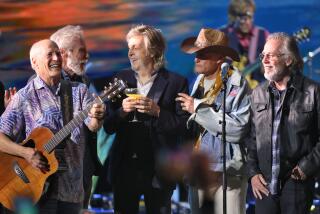Dennis Quaid the Singer Brings His, Um, Unique Talents to O.C.
- Share via
SAN JUAN CAPISTRANO — Just in time for Dennis Quaid’s performance Friday night at the Coach House, the U.S. Supreme Court ruled Thursday that opinions expressed in newspapers are now fair game for libel action. Hence, if I were to opine, say, that Mr. Quaid’s voice Friday sounded as if he were trying to expel Chicken McNuggets from his windpipe, he might sue me for it. McDonald’s might, even.
With a federally inspired sense of reserve, then, let’s say instead that on the scale of actors-turned-singers, Quaid weighs in somewhere in the vicinity of David Soul, Dan Blocker and Johnny Crawford, all very fine singers ! Yes!
Along with giving his fans a chance to ogle him in the flesh--it did seem rather like a Chippendale’s crowd--one other large benefit of Quaid’s presence is that it doubtlessly generates more work for his excellent group, the Swamptones. Consisting largely of members of Bonnie Raitt’s band, along with Texas saxman Joe Sublett and ex-Beausoleil sideman Steve Conn on keyboards, the outfit really has its bayou beats down.
They opened with a rollicking “Zydeco Blues,” featuring a blasting tenor solo from Sublett. Quaid’s voice landed on pitch most of the time, though his characterless growl did little to impart feeling to this lyric or the others he attempted.
The only tune to go entirely awry was “Shameless.” While clearly intended as a campy send-up of smarmy lounge ballads, Quaid’s voice was so off-register, and his audience-teasing stage moves so on-target, that the line between parody and reality was blurred.
Quaid sang half of the 14 songs, with Conn and Raitt guitarist Johnny Lee Schell handling the others. By odd coincidence, Conn and Schell provided the show’s high points. Schell gave a great, soulful vocal to “Hoping Love Will Make It Right,” punctuated with stinging guitar lines. Conn shone on the zydeco jumper “Time and Time Again,” which he peppered with some zesty accordion work, and “I Don’t Want to Talk About It,” which sounded a bit like Mose Allison melded with a New Orleans rhythmic sensibility.
Just because Quaid’s rhythm guitar was virtually non-existent in the mix doesn’t mean he didn’t contribute to the music. By doing enough rock-star grimacing and posturing for any 12 musicians, he freed the others to concentrate on their playing.
The performance was opened by frequent Juke Logan sideman Bill Lynch. Though accompanied only by a bassist, Lynch powered some motivatin’ blues out of his grained voice and ‘50s Silvertone guitar.
More to Read
The biggest entertainment stories
Get our big stories about Hollywood, film, television, music, arts, culture and more right in your inbox as soon as they publish.
You may occasionally receive promotional content from the Los Angeles Times.










